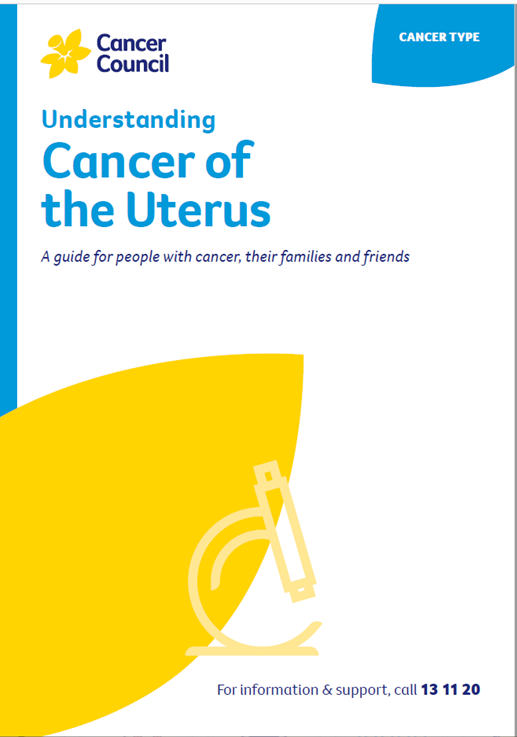- Home
- Cancer of the uterus
- Managing side effects
- Menopause
Menopause
The ovaries produce the hormones oestrogen and progesterone. If both ovaries have been removed or you’ve had radiation therapy to the pelvic area, your body will no longer produce these hormones and you will stop having periods. This is called menopause.
Learn more about:
Overview
For most women, menopause is a natural and gradual process that starts between the ages of 45 and 55. If you have not already entered menopause, these treatments will cause sudden menopause. If you have already been through menopause, the symptoms of menopause may come back.
Menopausal symptoms include:
- hot flushes
- night sweats
- dry or itchy skin
- mood swings
- trouble sleeping (insomnia)
- tiredness
- aching joints
- vaginal dryness
- weight gain
- bladder problems
- decreased interest in sex (low libido).
The symptoms of menopause caused by cancer treatment are usually more severe than during a natural menopause because the body hasn’t had time to get used to the gradual decrease in hormone levels.
Menopause may cause other changes in the body. For example, your cholesterol levels may rise, which can increase your risk of heart disease. Over time, your bones may become weak and brittle, and break more easily. This is called osteoporosis. Radiation therapy to the pelvis can also weaken the bones.
Tips for managing menopausal symptoms
- Vaginal moisturisers available over the counter from pharmacies can help with vaginal discomfort and dryness. Talk to your nurse for suggested products.
- Ask your doctor if you need to avoid products containing oestrogen. They can suggest non-hormonal medicines to relieve the symptoms of menopause.
- If your menopause symptoms are severe, talk to your doctor about the risks and benefits of taking menopausal hormone therapy (MHT). Previously called hormone replacement therapy (HRT), MHT is not usually used if you have cancer of the uterus, but may be considered in some cases if other treatments fail to manage symptoms. If you were on MHT when the cancer was diagnosed, your doctor will usually advise stopping its use as oestrogen can cause these cancers to grow.
- Talk to your doctor about having a bone density test or taking medicine to prevent your bones from weakening. Call 1800 242 141 or visit healthybonesaustralia.org.au for more information.
- Ask your doctor for a referral to a menopause clinic if needed.
- Have your cholesterol levels checked. If they are high, regular exercise and a balanced diet may help, or talk to your doctor about cholesterol-lowering drugs.
- Learn meditation and relaxation techniques. These may be helpful in reducing stress and some menopause symptoms.
- Several types of psychological therapies have been shown to help with menopause-related anxiety, low mood, sleep troubles and the impact of hot flushes. Talk to a psychologist about the best approach for you.
- Exercise can also help with mood changes and energy levels. Ask your doctor about suitable exercises or see an exercise physiologist or physiotherapist.
Podcast: Sleep and Cancer
Listen to more episodes from our podcast for people affected by cancer
More resources
A/Prof Orla McNally, Consultant Gynaecological Oncologist, Director Oncology/Dysplasia, Royal Women’s Hospital, Honorary Clinical Associate Professor, University of Melbourne, and Director of Gynaecology Tumour Stream, Victorian Comprehensive Cancer Centre, VIC; A/Prof Yoland Antill, Medical Oncologist, Peninsula Health, Parkville Familial Cancer Centre, Cabrini Health and Monash University, VIC; Grace Guerzoni, Consumer; Zeina Hayes, 13 11 20 Consultant, Cancer Council Victoria; Bronwyn Jennings, Gynaecology Oncology Clinical Nurse Consultant, Mater Hospital Brisbane, QLD; A/Prof Christopher Milross, Director of Mission and Radiation Oncologist, Chris O’Brien Lifehouse, NSW; Mariad O’Gorman, Clinical Psychologist, Liverpool Cancer Therapy Centre and Bankstown Cancer Centre, NSW.
View the Cancer Council NSW editorial policy.
View all publications or call 13 11 20 for free printed copies.
Need to talk?
Support services
Life after cancer treatment
Webinars, exercise and nutrition, sexuality programs, and back-to-work support
Need legal and financial assistance?
Pro bono services, financial and legal assistance, and no interest loans
Cancer information
Exercise and cancer
Learn exercise routines that can benefit you during and after cancer treatment.
Relaxation and meditation
Learn how relaxation and meditation can help you both during and after cancer treatment, or listen to our relaxation and meditation audio tracks

